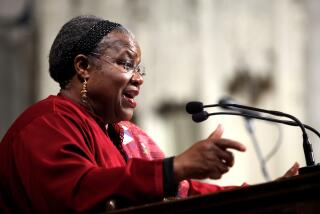June E. Johnson, 59; rights activist
- Share via
Civil rights activist June E. Johnson, who as a teenager in 1963 was beaten by white law enforcement authorities in a confrontation that led to federal charges, has died. She was 59.
Johnson died April 13 of kidney failure at Providence Hospital in Washington, D.C., said her son, Hakim Malik Johnson.
Born in the Mississippi Delta city of Greenwood, Johnson became involved in the Student Nonviolent Coordinating Committee when her parents played host to members of the group in their home.
In June 1963, on the way back from a voter registration workshop in South Carolina, Johnson was arrested at a Winona, Miss., bus station along with Fannie Lou Hamer, one of the founders of the Mississippi Freedom Democratic Party, and other activists when they tried to eat in the whites-only section.
At the jailhouse, the Montgomery County sheriff asked Johnson, then 15, whether she was a member of the NAACP. When Johnson answered yes, she was beaten in the face, then punched in the stomach.
“I raised my head, and the white man hit me in the back of the head with a club wrapped in black leather,” Johnson said in her statement, quoted in John Dittmer’s 1994 book “Local People: The Struggle for Civil Rights in Mississippi.”
“Blood was streaming down the back of my head and my dress was all bloody,” she said.
Hamer and three others also were beaten. The Kennedy administration’s Justice Department brought federal civil rights charges against five men, including the sheriff and the police chief, but they were cleared later that year by an all-white jury.
Johnson graduated from Stillman College in Tuscaloosa, Ala., and received a master’s degree in education from Mississippi’s Jackson State University in 1974.
She worked as a paralegal at North Mississippi Rural Legal Services in Greenwood. Attorney Solomon Osborne said she was often a plaintiff in lawsuits, including one challenging the local government’s hiring practices.
More recently, she worked in Washington for its child support enforcement office and other agencies, her family said. She also served as a consultant on documentaries about the civil rights movement.
More to Read
Sign up for Essential California
The most important California stories and recommendations in your inbox every morning.
You may occasionally receive promotional content from the Los Angeles Times.










